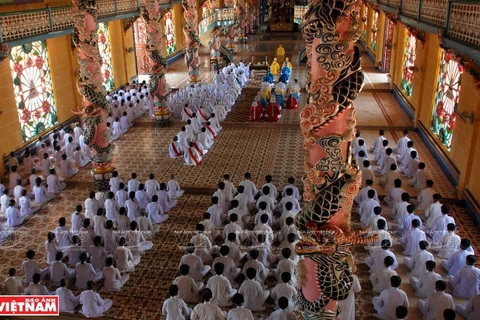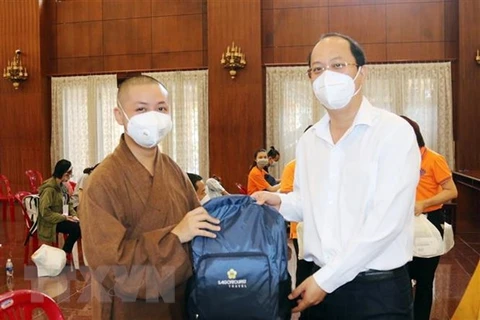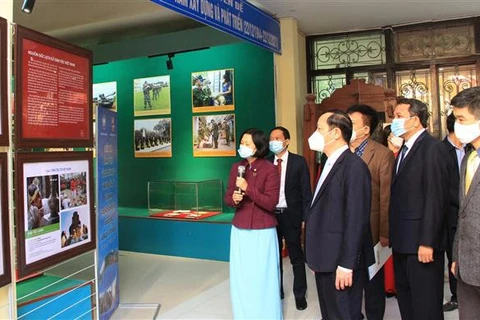Hanoi (VNA) – The Vietnamese Party and the State are implementing a strategic policy on making strong investment in mountainous and border areas and improving livelihoods of people, especially their legitimate need for religious practice.
The policy has helped ethnic minority groups improve their material and spiritual life, gain sound awareness and put their faith in the right religions, thus addressing the root of the spread of heresies.
Chairman of the People’s Committee of the northern mountainous province of Dien Bien Le Thanh Do said an array of central and local policies have been implemented in Muong Nhe district – a key, strategic area in the Northwestern region.
Most of the resources poured into Muong Nhe are focused on the settlement of local residents. Local infrastructure has been built, significantly contributing to ensuring national defence and security.
The province has also made efforts to ensure sustainable livelihoods and raise the material and spiritual life of ethnic minorities in Muong Nhe, Do said, adding that one of the solutions is to build production models based on the local advantage of land and forest.
Investment has been injected in forming concentrated material areas growing industrial trees of high economic values. Notably, a macadamia growing project in Muong Nhe district is expected to bear good fruit, opening up a new promising direction for local development.
The policy has helped ethnic minority groups improve their material and spiritual life, gain sound awareness and put their faith in the right religions, thus addressing the root of the spread of heresies.
Chairman of the People’s Committee of the northern mountainous province of Dien Bien Le Thanh Do said an array of central and local policies have been implemented in Muong Nhe district – a key, strategic area in the Northwestern region.
Most of the resources poured into Muong Nhe are focused on the settlement of local residents. Local infrastructure has been built, significantly contributing to ensuring national defence and security.
The province has also made efforts to ensure sustainable livelihoods and raise the material and spiritual life of ethnic minorities in Muong Nhe, Do said, adding that one of the solutions is to build production models based on the local advantage of land and forest.
Investment has been injected in forming concentrated material areas growing industrial trees of high economic values. Notably, a macadamia growing project in Muong Nhe district is expected to bear good fruit, opening up a new promising direction for local development.
The Central Highlands, encompassing five provinces of Kon Tum, Gia Lai, Dak Lak, Dak Nong and Lam Dong, is also an important region of the country in terms of economy, social affairs, and national defence and security.
With a population of more than 5 million people of many ethnic groups, the region is also home to large numbers of followers of various religions, with the four main ones being Buddhism, Catholicism, Protestantism and Cao Dai, among others, which is a vivid picture of the ethnic and religious life in Vietnam in general and the Central Highlands in particular.
Over the past years, various policies on socio-economic development have been issued. Thanks to such policies, the living standards of residents in the Central Highlands have been improved significantly. Ethnic minority groups and religions in the region have contributed greatly to socio-economic development, and national defence and security.
Assoc. Prof. Dr. Le Van Loi, Deputy Director of the Ho Chi Minh National Academy of Politics, has highlighted the links between ethnicity and religions in the Central Highlands, which he said have distinctive characteristics and serve as a foundation and a pillar in the spiritual life of local residents.
The multi-layered belief system in the region and religious activities of individuals and communities create the rich and distinctive community culture of the Central Highlands. Meanwhile, the introduction of new religions and beliefs to the community has diversified the ethnic and religious structures in the Central Highlands while also bringing changes and disorder to the community culture and the life of local residents.
Reality shows that limitations in socio-economic development, partially due to difficulties in connecting the region with the remaining parts of the country, especially economic centres, have hindered poverty reduction in the region.
However, the Central Highlands is changing day by day. Local authorities have always paid attention and created favourable conditions for people to exercise the right to freedom of belief and religions, along with ensuring equality between religions.
Religious practice has positively impacted the cultural life and daily activities of ethnic minorities in the Central Highlands, changing the local out-of-date lifestyle which was passed down from generations to generations. Outdated customs and practices have been eliminated and replaced by a civilized and modern lifestyle./.
With a population of more than 5 million people of many ethnic groups, the region is also home to large numbers of followers of various religions, with the four main ones being Buddhism, Catholicism, Protestantism and Cao Dai, among others, which is a vivid picture of the ethnic and religious life in Vietnam in general and the Central Highlands in particular.
Over the past years, various policies on socio-economic development have been issued. Thanks to such policies, the living standards of residents in the Central Highlands have been improved significantly. Ethnic minority groups and religions in the region have contributed greatly to socio-economic development, and national defence and security.
Assoc. Prof. Dr. Le Van Loi, Deputy Director of the Ho Chi Minh National Academy of Politics, has highlighted the links between ethnicity and religions in the Central Highlands, which he said have distinctive characteristics and serve as a foundation and a pillar in the spiritual life of local residents.
The multi-layered belief system in the region and religious activities of individuals and communities create the rich and distinctive community culture of the Central Highlands. Meanwhile, the introduction of new religions and beliefs to the community has diversified the ethnic and religious structures in the Central Highlands while also bringing changes and disorder to the community culture and the life of local residents.
Reality shows that limitations in socio-economic development, partially due to difficulties in connecting the region with the remaining parts of the country, especially economic centres, have hindered poverty reduction in the region.
However, the Central Highlands is changing day by day. Local authorities have always paid attention and created favourable conditions for people to exercise the right to freedom of belief and religions, along with ensuring equality between religions.
Religious practice has positively impacted the cultural life and daily activities of ethnic minorities in the Central Highlands, changing the local out-of-date lifestyle which was passed down from generations to generations. Outdated customs and practices have been eliminated and replaced by a civilized and modern lifestyle./.
VNA
























